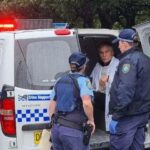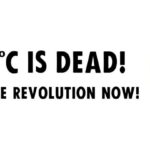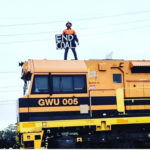Imprisoned for Defending the Climate: An Interview With Blockade Australia’s Max Curmi
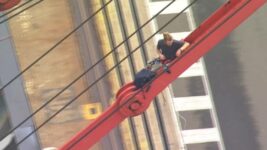
After scaling multiple barbed wire fences to waltz into Sydney’s Port Botany, Max Curmi scaled a 60-metre-high crane at around 2 pm on 25 March and achieved his aim, which was to obstruct the loading of the ship beneath him, so as to impinge upon the profits of the companies involved.
The 26-year-old was well aware that it was a risky action to partake in, but, then again, he was only endangering his own life, unlike the expansionist Australian system that he was targeting, as its continuing to threaten the lives of billions and the future of the planet in the name of short-term gains.
NSW police showed up a few hours later. The young climate defender was removed from the crane, arrested and taken into custody. And on Monday 28 March, Curmi appeared before Waverley Local Court, where the magistrate sentenced him to four months prison time and refused him bail.
After spending a little over two weeks on the inside, Curmi was eventually granted bail by the District Court, under strict conditions, which mean he cannot communicate with anyone from the climate group Blockade Australia and nor can he partake in any further climate actions.
Targeting the bank balances of magnates
Curmi wasn’t the only climate defender to be handcuffed and dragged away from Port Botany, as Blockade Australia disrupted one of the nation’s largest ports for five days straight, via nine separate nonviolent direct actions, with nine activists being arrested all up.
Some like to refer to people like Curmi as ratbags. However, the number of these critics is decreasing rapidly, after the extended drought was followed by the megafires that burnt 20 percent of mainland forest to the ground, and the recent floods that wiped out Lismore and other towns.
Indeed, as the climate crisis heightens before our very eyes, it’s the climate deniers who are increasingly appearing as if they’ve got a screw loose.
The recently formed Blockade Australia has upped the ante when it comes to taking nonviolent direct actions in relation to the climate crisis, as rather than seeking permission to march in the streets, they’re directly upsetting the smooth running of the Australian system.
Blockade’s first major disruptive actions targeted Newcastle Coal Port over two weeks last November. And the climate group has now got its sights set on the continent’s economic centre, the city of Sydney, for a series of disruptive actions commencing on 27 June.
The authoritarian creep
Due to the actions taken by Blockade Australia and another key group, Fireproof Australia, which has also escalated the impact its civil disobedience actions are having on business as usual, the Perrottet government passed some of the most draconian anti-protest laws in the western world on a whim.
What the NSW Liberal Nationals government has done – with the nod from Labor – is effectively ban protests from roads, bridges, tunnels, and major facilities that the government doesn’t approve of via threat of up to 2 years imprisonment and/or a $22,000 fine.
Sydney Criminal Lawyers spoke to ardent climate defender Max Curmi about his fears for the future of the planet, why he considers the new anti-protest laws are actually the Australian way, and how the crisis, the civil disobedience and the sanctions are all likely to escalate even further.
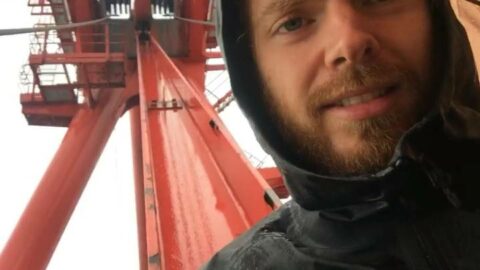
On 25 March, you ran into Port Botany, climbed over multiple barbed wire fences and went on to scale a crane, which meant that loading the freighter ship below was delayed.
This was a pretty risky action both in terms of liberty and safety. Max, what is it about the state of the planet today that led you to go to these extremes?
The state of the planet is terrible. We’re looking down the barrel of total environmental collapse.
The people in power and the people that protect them have made it really clear that they’re going to prioritise the expansion of the economy into the future above the continuation of complex life on Earth.
Taking the action that I did might seem a bit more extreme than demonstrating on the street. But in the end, this is nonharmful direct action that’s getting in the way of the industry’s operations.
People have been taking direct actions for a very long time. My being sentenced to gaol is extreme. But I’m trying to stop the continued destruction of the continent.
Australian industry is saying that we need to get out of its way. And it’s a lot more powerful than us. So, they’re going to punish us for getting in the way of their agenda.
Your action was part of a coordinated five days of actions taken by climate group Blockade Australia, which saw nine different climate defenders arrested.
What did Blockade Australia achieve through this five-day series of nonviolent direct actions?
We demonstrated that the effectiveness of the disrupting of the Australian program is both possible and necessary to force the change we need to shift the incredibly serious life-threatening situation of life on Earth.
We’re putting forward a position that hasn’t really been taken that much in dealing with the climate issue.
We’re saying that this system is not fit for purpose and is delivering destruction on a wide scale.
If people are concerned about this issue, they need to start taking matters into their own hands and taking direct action to stop the system, because if we don’t do that, we have very little capacity to stop the ongoing destruction we’ve been seeing over the last three years.
A lot of people were shocked that you were sentenced to four months prison in relation to a nonviolent climate protest. But since that time, Fireproof Australia’s Andrew George has been sentenced to three months inside for simply invading a football match.
And then, of course, Blockade Australia’s Sergeio Herbert was sentenced to 12 months imprisonment back in November for actions being taken at Newcastle Coal Port.
Not long ago, we weren’t seeing the authorities cracking down so harshly on climate defenders who take direct action in order to bring a focus to the climate emergency.
So, how would you describe this new approach and what do you think it means?
The crackdown on climate protesters is relatively new. But Australia is an authoritarian state. It has always used incarceration and violence to deal with people who don’t subscribe to the program.
Australia has locked up heaps of First Nations people. It has murdered heaps of First Nations people. It has directly attacked unionists.
That is the way Australia has operated since it started. So, in my mind, if we start taking these climate actions effectively, this is what’s going to happen.
What is really scary about this is that in such a short period of time, they’ve shown how willing they are to take this course.
I encourage people to think about how this type of reaction is not entirely new. This is the way that Australia always deals with political opposition.
But we can’t let them destroy the world. We have to take a stand, and we have to do something that is meaningful given that there really isn’t a pathway to our survival through the electoral process or through the courts.
There is nothing that can really stop this kind of extended project.
So, people are organising more actions, and there are, unfortunately, probably going to be even more of these harsh penalties.
If you look around the world, over 200 activists were murdered last year. This is the scary reality.
We are dealing with powerful people who are not prepared to change the way they operate.
In response to the recent Blockade Australia and Fireproof Australia actions, the Perrottet government rammed through some of the most extreme anti-protest laws in the western world.
These effectively give the government the means to lock up protesters for demonstrating on any issue that they don’t approve of.
What are your thoughts on this reaction from the NSW Coalition government?
It’s terrible, but it’s not really shocking. The Labor government and the Coalition have been doing this for the last five years.
In Queensland and Victoria, they’ve been ramping up state powers to restrict people’s ability to participate in nonviolent political action.
Each generation has a fight. And my generation’s is the damage that’s being done to the planet. And this is an authoritarian response that we’re just going to have to find a way to get through or else they’ll crush us.
Blockade Australia has a series of protest actions lined up for Sydney over the period 27 June to 2 July. Obviously, you won’t be partaking in them now.
But, in your opinion, are these new laws likely to hamper what the group has planned? And how would you say they’re going to affect the nation’s largest city?
The premise of the protest is to cause chaos in the economic centre of this continent. I’m not in contact with people involved with it at the moment because I don’t have permission to be. But I gather that’s still the intention.
My belief is that there are a lot of people who are concerned with the climate, and we have very little time to act, so I hope that these new laws don’t scare too many people away from participating.
With the extreme weather events that we have been seeing here, there are significant community concerns and there is a growing awareness of just how inadequate the current system is.
It’s not going to be able to deal with this crisis. In fact, it’s refusing to act upon it.
Blockade Australia should be able to cause a large amount of disruption to the economic centre and make it really clear that it does not accept the state model destruction of our world. It’s unacceptable.
And lastly, Max, as we’ve discussed, the climate crisis is already upon us, and the extreme weather events are mounting, not just in Australia, but in a continuous cycle around the globe. Following the Sydney floods, South Africa got some of the same.
However, the authorities are enacting policies that actually promote further global heating, and rather than heeding the calls of the protesters, they’re simply enacting more laws with drastically escalating penalties.
As someone on the frontline, who’s keeping abreast of all of this, how do you see this situation developing from here?
It’s up to us. If we can start to get thousands of people to begin organising resistance, then we could see governments starting to back down on the laws and the major structures of their practices.
But if it’s left to just a small number of people, then it might be looking pretty grim.
We can expect to see a continued rise in authoritarianism and we’re seeing government reinforcing their police forces in the capacity to squash climate dissent.
That may change. I hope it does. But that seems to be the most likely path that’s going to be taken.
We should expect more of this sort of punishment and more of this sort of resistance as the crisis continues to escalate and people become more aware of just how limited the options for taking action are.



